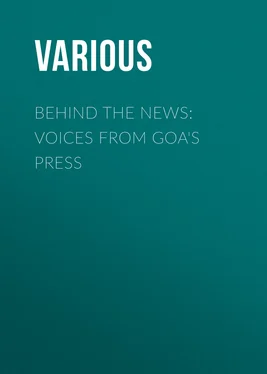Various - Behind the News - Voices from Goa's Press
Здесь есть возможность читать онлайн «Various - Behind the News - Voices from Goa's Press» — ознакомительный отрывок электронной книги совершенно бесплатно, а после прочтения отрывка купить полную версию. В некоторых случаях можно слушать аудио, скачать через торрент в формате fb2 и присутствует краткое содержание. Издательство: Иностранный паблик, Жанр: foreign_prose, foreign_antique, на английском языке. Описание произведения, (предисловие) а так же отзывы посетителей доступны на портале библиотеки ЛибКат.
- Название:Behind the News: Voices from Goa's Press
- Автор:
- Издательство:Иностранный паблик
- Жанр:
- Год:неизвестен
- ISBN:нет данных
- Рейтинг книги:4 / 5. Голосов: 1
-
Избранное:Добавить в избранное
- Отзывы:
-
Ваша оценка:
- 80
- 1
- 2
- 3
- 4
- 5
Behind the News: Voices from Goa's Press: краткое содержание, описание и аннотация
Предлагаем к чтению аннотацию, описание, краткое содержание или предисловие (зависит от того, что написал сам автор книги «Behind the News: Voices from Goa's Press»). Если вы не нашли необходимую информацию о книге — напишите в комментариях, мы постараемся отыскать её.
Behind the News: Voices from Goa's Press — читать онлайн ознакомительный отрывок
Ниже представлен текст книги, разбитый по страницам. Система сохранения места последней прочитанной страницы, позволяет с удобством читать онлайн бесплатно книгу «Behind the News: Voices from Goa's Press», без необходимости каждый раз заново искать на чём Вы остановились. Поставьте закладку, и сможете в любой момент перейти на страницу, на которой закончили чтение.
Интервал:
Закладка:
And Herald did manage to provide some relief (comic relief, according to critics) from the tedious fare offered by the NT. It was sharp and pungent – too pungent for many. Almost every report packed a sting in its tail. Some of the fare dished out in the guise of investigative journalism was just gossip laced with outrageous bias. But all this lighted the scene up and served as a reminder to the NT to wake up and take notice.
Rajan Narayan never hesitated to name his rivals, especially the NT, while making disparaging remarks. The NT, on the other hand, took a diametrically opposite stance: it skirted controversies altogether. Its unwritten policy was never to report or comment on anything controversial, let alone naming names!
But that had to change to keep pace with the changing times. I lampooned Rajan Narayan in my columns occasionally, which Mudaliar permitted reluctantly. It must be said to Rajan Narayan's credit that he not only took my pot-shots in good humour, but, according to Herald sources, also stopped a couple of juniors who wanted to hit back at me.
I met Rajan Narayan only once; but then it was hardly a meeting. Rather, I saw him from a distance at a midnight carnival in Panjim. After the edition was over, my NT colleague Anthony and I decided to take a round. We saw Rajan Narayan surrounded by a group of revellers. In a red T-shirt and bermudas, with a red ribbon around his head and a glass of feni in hand, a wobbly Rajan Narayan with bleary eyes was quite a spectacle. Anthony nudged me and asked, "Can you imagine Mudaliar in such a scene?"
Never. Mudaliar was, by comparison, dapper. In fact, his first advice to me when I called on him for a job interview was to be always mindful of my reputation. "It's a small place. Everybody knows everybody. And liquor is cheap here," he had said.
I left Goa rather bitterly.
I fell out with Mudaliar over an innocuous remark in my column. I used to report the traditional cricket match between the legislators and journalists in the column in a running commentary form. That year (1989), the Legislators XI led by Chief Minister Rane trounced the Press XI, led by Mudaliar. I made a passing remark that age was apparently catching up with Mudaliar. He deemed it too personal, and stopped talking to me. There were enough people around to fan the fire; and he refused to recommend me for a promotion. One thing led to another and I soon decided that my future lay elsewhere.
But I've no hard feelings about anything now. In fact, I recall my days in Goa with nostalgia and gratitude. It was a turning point in my career and I fondly remember my association with a wonderful people. I learned many things in Goa that stood me in good stead in later life and it will always remain etched in my memory as a part of my youth.
I wish all my friends and acquaintances over there, especially Rajan Narayan, good health and success in whatever they are engaged in now! I learnt of Mudaliar's death quite recently through an e-mail. I was saddened. I fondly recall my association with him. Despite the differences of opinion that resulted in our parting of ways, Mudaliar was a thorough gentleman and working with him was an enriching experience. I cherish his memories!
Chapter 6: O HERALDo: an untold chapter
Valmiki Faleiro, a Goa-based working journalist between 1975-83, covered Goa for national publications like The Current Weekly, the Free Press Journal group and the Indian Express. He was Staff Reporter with the West Coast Times and as a freelancer, contributed to various journals like The Navhind Times, Goa Today, The Sun Weekly, Newstrek, Detective Digest, Mirror, Newsmag.
The early 1980s. Happy days were here again for Goa's first English-language daily, The Navhind Times (NT). After a brief challenge to its other crucial attribute, that of being the only English-language daily, from Goa Monitor in the late 1960s, NT had just staved off another. West Coast Times, launched July-1978, blazed a luminous trail in quality journalism but, like a comet after a brief showing, vanished into oblivion.
NT was back to its snug-seat monopoly.
A slave of the economic thought of Adam Smith, David Ricardo and John Stuart Mill, or our own Nani Palkhivala, JRD Tata and M.R. Pai, I have been a votary of free enterprise and competition – and allergic to monopolies. A monopoly is bad for any consumer. And infinitely worse in a crucial commodity that helps form a society's opinion.
I had been speaking to some wealthier Goans, my idea of launching a broadsheet weekly, which would, over a period, be converted to a full-fledged daily. A tabloid (like Goa Monitor) did not appeal; and mere excellence in editorial content and quality printing (like West Coast Times) did not suffice. What mattered was the capacity to financially sustain a daily newspaper (by absorbing annual losses even while continuing to maintain quality) until the product turned round, which could take some years. That kind of money in Goa only mineowners had – like all of Goa's major dailies! So my idea was start small, stay around till you built adequate advertising recognition and support, and only then convert to a daily – at a fraction of a daily's budgetary requirement and without having to own printing facilities from day one.
Even then, not many Goan businessmen I was in touch with were willing to risk any substantial venture capital.
It was around this time, June 1983, if I recall the month correctly, that a mutual friend in the printing business in Mumbai and Goa, told me that A.C. Fernandes, Patrao of the Panjim stationers Casa J.D. Fernandes, was toying with the idea of an English-language daily. The mutual friend suggested I discuss my ideas with Fernandes.
A.C. Fernandes wasn't a mineowner, not yet anyway, but I had heard he was a shrewd businessman. He purchased Goa's only extant Portuguese-language daily, O Heraldo, not so much for love of the language or its dwindling local readership, but evidently for the intrinsic value of its press and its centrally-located premises. It was said he took full advantage of the daily's lable, in those days of the Permit Raj, to import (from Italy?) a Lino typesetting machine, which actually was used for all and sundry job works of the business house – even as the major part of good ole O Heraldo continued to be composed by hand!
But what the heck! A shrewd and street-smart man, I reckoned, would any day be better than a cash-filled dumbo. Moreover, what Patrao may have lacked by way of adequate resources was made up in having his priorities right. His love Goa and her way of life, his concern about increasing corruption in Goa's polity and aspiration for rightful honour to the mother tongue, were transparently genuine.
The mutual friend arranged our introductory meeting, over lunch at the A.C. Fernandes residence at Santa Cruz one rainy Sunday. The sharp-eyed (and, as I was later to discover, sharp-tempered) Patrao, his demure wife and sons, John, Raul and Oswald, with the mutual friend and I sat across a carefully laid table. I spoke about WCT and why it failed, my ideas for a successful daily and my business plan for such a venture. A.C. Fernandes (the sons, those days, played second fiddle), I think, was impressed. And thus began a relationship, where I did my best to midwife a second English-language daily for Goa – or almost.
The search was on for an Editor. Ads had been placed in the major national dailies. Surprisingly, about a dozen pros were willing to come to Goa! But the best were out of reckoning, they expected salaries the kind Patrao never figured existed! Ervelle Menezes was the best bet. When I covered Goa for the Indian Express a couple of years before, Ervelle was a Chief Sub at IE's Mumbai edition. After Bhat, the then News Editor, died in harness, Ervelle had taken over as the News Editor and was in that position at this point of time.
Читать дальшеИнтервал:
Закладка:
Похожие книги на «Behind the News: Voices from Goa's Press»
Представляем Вашему вниманию похожие книги на «Behind the News: Voices from Goa's Press» списком для выбора. Мы отобрали схожую по названию и смыслу литературу в надежде предоставить читателям больше вариантов отыскать новые, интересные, ещё непрочитанные произведения.
Обсуждение, отзывы о книге «Behind the News: Voices from Goa's Press» и просто собственные мнения читателей. Оставьте ваши комментарии, напишите, что Вы думаете о произведении, его смысле или главных героях. Укажите что конкретно понравилось, а что нет, и почему Вы так считаете.












